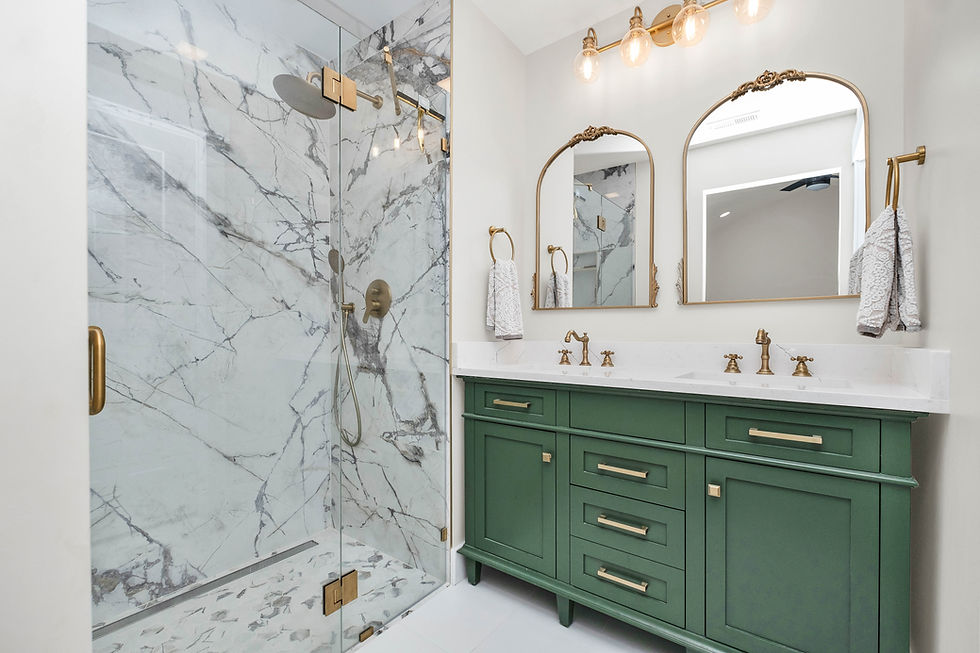Best Flooring Options for Bathroom Remodels
- SEO Zeal Media
- Jul 3
- 3 min read
Choosing the right flooring for a bathroom remodel is essential—it's a balance of style, comfort, safety, and durability. With moisture, varying temperatures, and heavy foot traffic, bathroom floors require careful material selection. Here, we explore the Best Bathroom Flooring choices, compare Bathroom Tile Vs. Vinyl, and highlight top Waterproof Bathroom Floors for your next renovation.
No matter whether you're updating a powder room, guest bath, or luxury master bathroom, The Repair Gurus guide you to a floor that's both beautiful and built to last.
1. Porcelain & Ceramic Tile: Durable & Design-Ready
Overview: Porcelain and ceramic are classic favorites for bathrooms thanks to their waterproof properties and wide design range.
Advantages:
Fully waterproof (including grout if sealed properly)
Vast selection: colors, patterns, sizes, finishes
Compatible with radiant floor heating
Highly durable—even against heavy traffic
Drawbacks:
Feels cold and hard underfoot without radiant heat
Requires professional installation
Grout needs maintenance to prevent mildew
Best For: Homeowners prioritizing aesthetics and longevity, especially in full baths.
2. Luxury Vinyl Plank (LVP) & Luxury Vinyl Tile (LVT)
Overview: Today's vinyl mimics wood or stone aesthetics while delivering excellent waterproof performance.
Advantages:
100% waterproof, ideal for bathrooms and basements
Warmer and softer than tile
Easy to install with click-lock systems
DIY-friendly and budget-conscious
Drawbacks:
Less resale appeal compared to natural materials
Lower-grade vinyl can dent or scratch over time
Best For: Renovations focusing on comfort, style, and affordability.

3. Natural Stone (Marble, Slate, Granite)
Overview: Natural stone brings organic elegance and unique character, making it a luxurious bathroom flooring choice.
Advantages:
Elegant, timeless look with natural variations
Extremely durable and long-lasting
Feels luxurious underfoot
Drawbacks:
High cost for materials and installation
Requires annual sealing to maintain condition
Heavy—might need subfloor reinforcement
Best For: High-end remodels where aesthetics and sophistication are priorities.
4. Waterproof Core Engineered Wood
Overview: Select engineered wood floors now include waterproof cores suited for bathroom use.
Advantages:
Warm, natural wood look
More water-resistant than traditional hardwood
Comfortable on bare feet
Drawbacks:
Not fully waterproof—avoid standing water
Fewer styles and higher cost than LVP
Furniture and debris can cause dents
Best For: Those seeking a cozy, spa-like feel with moderate moisture concerns.
5. Stone-Look Porcelain Tile
Overview: Stone-look porcelain combines the beauty of natural stone with the durability of porcelain.
Advantages:
Waterproof and highly wear-resistant
Mimics stone without high maintenance or weight
Grout-compatible with radiant heating options
Available with slip-resistant finishes
Drawbacks:
Hard underfoot, needs a professional install
Requires regular grout care
Best For: Those desiring upscale stone aesthetics without the upkeep.

6. Rubber Flooring
Overview: Rubber flooring—often seen in gyms—is becoming popular for its comfort and resilience in bathrooms.
Advantages:
Fully waterproof and slip-resistant
Cushioned and comfortable
Naturally antimicrobial
Drawbacks:
Limited design options
More common in commercial or functional residential spaces
Best For: Accessible or aging-in-place bathrooms where safety matters.
7. Waterproof Laminate Flooring
Overview: New waterproof laminate resembles real wood but is designed for moisture-prone areas.
Advantages:
Wood-like visuals with an affordable price
Click-lock installation simplifies DIY projects
Water-resistant core offers basic protection
Drawbacks:
Not entirely waterproof like LVP or tile
May have lower perceived value in luxury homes
Best For: Powder rooms or guest bathrooms where water exposure is minimal.
Bathroom Tile vs Vinyl: Quick Comparison
Feature | Tile (Porcelain/Ceramic) | LVP / LVT |
Waterproof | Yes (with sealed grout) | Fully waterproof |
Underfoot Comfort | Hard and cool | Softer and warmer |
Durability | Long-lasting and heavy-duty | Durable but prone to dents |
Cost Range | Mid–high | Budget–mid |
Resale Impact | High-end appeal | Practical but less premium |
Installation Difficulty | Moderate–high | Easy–moderate |
Choosing the Right Floor for Your Space
Water Exposure: Full baths or lower-level remodels benefit from tile or LVP.
Comfort: LVP and rubber offer warmer, cushioned feelings.
Style Focus: Stone, tile, or wood aesthetics? That guides your choice.
Installation: Vinyl offers DIY simplicity; tile often requires pros.
Maintenance: Tile demands grout upkeep, vinyl requires simple cleaning.
Expert Installation with The Repair Gurus
At The Repair Gurus, we offer:
In-depth Design Consultations for floor selection
Access to premium porcelain, vinyl, stone, and more
Expert installation including waterproofing, sealing, and heating prep
Full Warranty And Reliable Project Management
With our expertise, your bathroom will feature flooring that blends beauty with longevity.
Final Takeaways
From porcelain tile to luxury vinyl, there's a flooring option to suit every taste and practical need. Tile and stone deliver unmatched durability, while vinyl and rubber offer comfort and waterproof performance. Let us guide you toward flooring that enhances beauty, function, and value in your next bathroom remodel.
Ready to renovate? Explore our Bathroom Remodeling Services or Contact Us to get your free estimate and design consultation.
%20004%2020hrs%20rev%2001-01.png)





Comments